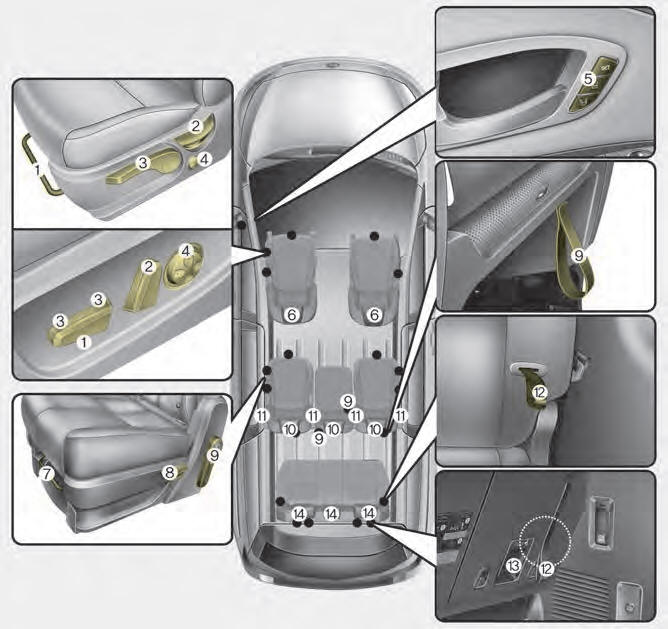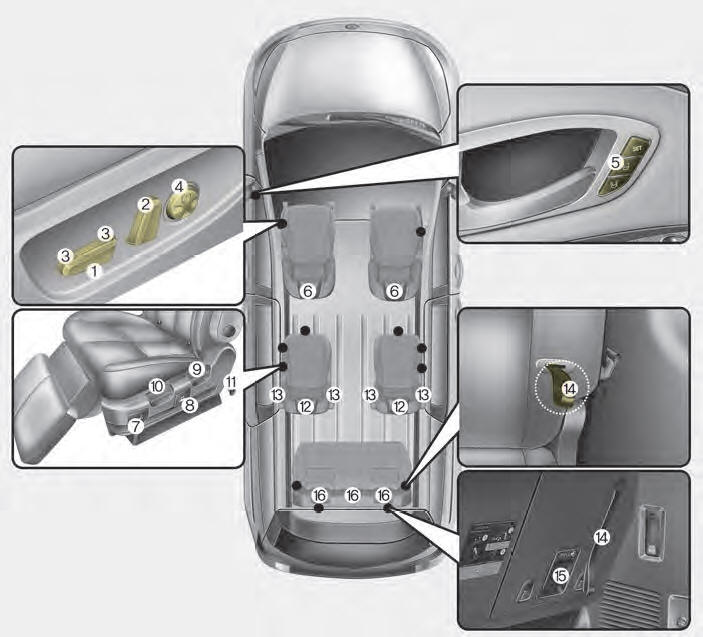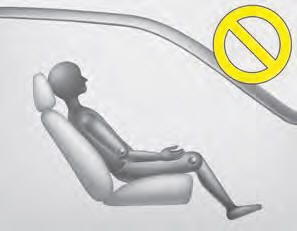
Kia Carnival Owners Manual
SeatsSafety features of your vehicle / Seats

Front seat
(1) Forward and backward
(2) Seatback angle
(3) Seat cushion height
(4) Lumbar support (Driver’s seat)
(5) Driver position memory
(6) Headrest
2nd / 3rd row seat
(7) Forward and backward
(8) Seatback angle and folding
(9) Walk in
(10) Headrest
(11) Armrest
(12) Seatback angle and folding
(13) Seat sinking
(14) Headrest

For SXL package
Front seat
(1) Forward and backward
(2) Seatback angle
(3) Seat cushion height
(4) Lumbar support (Driver’s seat)
(5) Driver position memory
(6) Headrest
2nd / 3rd row seat
(7) Forward and backward
(8) Left and right
(9) Seatback angle and folding
(10) Leg support
(11) Walk in
(12) Headrest
(13) Armrest
(14) Seatback angle and folding
(15) Seat sinking
(16) Headrest
![]()
Do not place anything in the driver's foot well or under the front seats. Loose objects in the driver's foot area could interfere with the operation of the foot pedals.
![]()
Do not press the release lever on a manual seatback without holding and controlling the seatback. The seatback will spring upright possibly impacting you or other passengers.
![]()

The driver must advise the passenger to keep the seatback in an upright position whenever the vehicle is in motion. If a seat is reclined during an accident, the occupant's hips may slide under the lap portion of the seat belt, applying great force to the unprotected abdomen.
![]()
Occupants should never sit on aftermarket seat cushions or sitting cushions.
The passenger's hips may slide under the lap portion of the seat belt during an accident or a sudden stop.
![]()
- Never attempt to adjust the seat while the vehicle is moving. This could result in loss of control of your vehicle.
- Do not allow anything to interfere with the normal position of the seatback and seatback adjustment.
- Sit as far back as possible from the steering wheel while still maintaining comfortable control of the your vehicle. A distance of at least 10" from your chest to the steering wheel is recommended. Failure to do so can result in air bag inflation injuries to the driver.
![]()
Always lock the rear seatback before driving. Failure to do so could result in passengers or objects being thrown forward injuring vehicle occupants.
![]()
Do not stack pile or stack luggage or cargo higher than the seatback in the cargo area. In an accident the cargo could strike and injury a passenger. If objects are large, heavy or must be piled, they must be secured in the cargo area.
![]()
Do not allow passengers to ride in the cargo area under any circumstance. The cargo area is solely for the purpose of transporting luggage or cargo.
![]()
After adjusting a manual seat, always check that it is locked by shifting your weight to the front and back. Sudden or unexpected movement of the driver's seat could cause you to lose control of the vehicle.
![]()
- Do not adjust the seat while wearing seat belts. Moving the seat forward will cause strong pressure on the abdomen.
- Do not place your hand near the seat bottom or seat track while adjusting the seat. Your hand could get caught in the seat mechanism.
![]()
Use extreme caution when picking small objects trapped under the seats or between the seat and the center console. Your hands might be cut or injured by the sharp edges of the seats mechanism.
Front seat adjustment - manual
Front seat adjustment - power
Driver position memory system
Headrest (for front seat)
Seatback pocket
Rear seat adjustment
Headrest (for rear seat)






